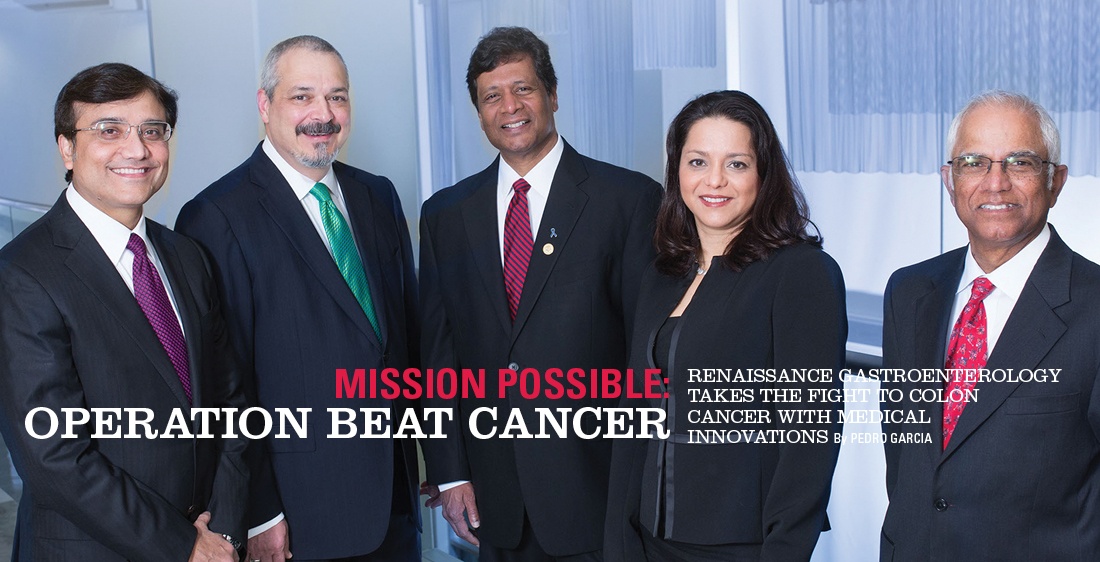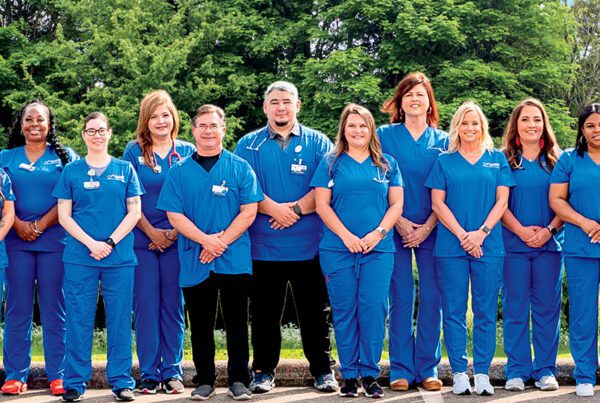Dr. Carlos J. Cardenas vividly remembers the prognosis. It was colon cancer.
It was the same type of cancer he had devoted his career to, helping countless patients combat for years, only this time he was the patient. He was the one receiving the awful news from a doctor.
Like it usually does, being diagnosed with cancer turned Cardenas’ life upside down. He went from treating his condition to fighting it. He turned to his practice at Renaissance Gastroenterology and Doctors Hospital at Renaissance (DHR), which he helped create in 1997.
“I think our organization and our hospitals are excellent providers of care for our community,” Cardenas says. “It’s a top-tier organization, and I’m very proud to say that all of my treatment was done here. I had all the confidence that everything would be done right.”
Cardenas is now a cancer survivor, and his ordeal has made him a better doctor.
“I know what it’s like to be told that you have cancer as a patient. Your heart sinks down to your feet” -Dr. Carlos J. Cardenas
“I’ve been a patient,” Cardenas says. “Having gone through my own experience made me a better gastroenterologist. I thought I was pretty good until I was on the other side of the rail. I don’t think anyone really appreciates quality healthcare or how it’s delivered until you’re a patient.”
“It’s a valuable perspective. I know what it’s like to be told that you have cancer as a patient. Your heart sinks down to your feet,” Cardenas explains, adding, “For me, it was a life-changing event. I think I’m better for it. I think my patients benefit because I too have walked in their shoes.”
According to the Centers for Disease Control and Prevention, colon cancer, or colorectal cancer, is the second-leading cancer killer in the United States.
The greatest tool in treating colon cancer is early detection, which means screening, a service offered every day at Renaissance Gastroenterology. These colorectal screenings can detect pre-cancerous polyps or abnormal growths in the colon or rectum, which can be removed before developing into cancer. Early detection often also leads to a cure.
“This is a preventable disease through screening,” Cardenas says. “In fact, it was screening that saved my life.”

Dr. Cardenas explains that, “People need to understand that a common symptom of colon cancer is that there is no symptom at all. By the time you begin to have symptoms, it’s already further along. Maybe you’ll have some sort of symptom early in its evolution, but that’s typically not the case until the disease is much further along.”
Renaissance Gastroenterology’s Dr. Ingrid Chacon said the majority of those who should be undergoing screenings simply aren’t.
“Colon cancer is the second most lethal cancer in the U.S.,” Chacon said. “Timely colonoscopy exams will help patients receive an early diagnosis and favorable prognosis, but most importantly, it will help them prevent colon cancer all together. Currently, only 40 to 50 percent of people who need colon cancer screenings are complying with recommendations. As a team, our goal is to increase that number and decrease the mortality and morbidity associated with colon cancer in our community.”
Part of the reason screenings are overlooked is because of the common misconception about the procedure itself. Dr. Subrahmanyan Behara, the first gastroenterologist to practice in the Rio Grande Valley, said preparation for the screening is intensive, but the procedure is quick and basic.
“Screening is the only way to prevent colon cancer from spreading” -Dr. Subrahmanyan Behara
“Most people are under the impression that the procedure is very difficult,” Dr. Subrahmanyan Behara says. “It’s not difficult. Preparation is key, and a lot of people, when they understand the need for the test, don’t mind the preparation.”
“Screening is the only way to prevent colon cancer from spreading,” Dr. Behara shares, explaining that with screening, “You can diagnose it and detect it early, the approach is curative. When you diagnose colon cancer early, you can cure it. When it spreads to distant organs, the treatment and chemotherapy is not effective most of the time. A lot of advances are being made in chemotherapy, but you don’t want to get to that stage. You want to nip it in the bud early on.”
“Colorectal cancer, second only to lung cancer as the leading cause of cancer deaths in the United States, effects men and women equally” -Dr. Murthy Badiga
Colleague Dr. Murthy Badiga said colon cancer is also an ailment that strikes both men and women alike.
“Colorectal cancer, second only to lung cancer as the leading cause of cancer deaths in the United States, effects men and women equally,” Dr. Badiga explains. “Yet few Americans know that colorectal cancer can be prevented, not just detected, through colonoscopy. According to the American Cancer Society, the colon cancer death rate in this country could be cut in half if Americans simply followed recommended screening guidelines. Last year alone, more than 50,000 people died of colorectal cancer in the United States.”
“For tactical purposes, the screening recommendation is the same for men and women” -Dr. Asif Zamir
Dr. Asif Zamir agrees.
“There’s no recommendation at this point to look for the disease more aggressively in men than women,” Dr. Zamir says, adding that, “Incidences are more or less the same, maybe slightly higher in men, but they’re not enough to change the guidelines in screenings. For tactical purposes, the screening recommendation is the same for men and women.”
Dr. Zamir explained that the topic is important because of how common colon cancer is. He further explains that: “it [colon cancer] is the third most common cancer in the United States and the second leading cause of cancer deaths in the United States, so obviously this [screening] is something that is very important. The general public should be aware, as well as know the measures and means of how to diagnose it [colon cancer] in its early stages so you can cure it. By detecting it early, there’s a way to prevent it.”
Renaissance Gastroenterology is a leader in its field in the Rio Grande Valley with a combined experience of some 99 years in the treatment of digestive disease. The practice includes doctors Badiga, Behara, Cardenas, Chacon and Zamir.

Its services include abdominal pain, constipation, hepatitis, gastritis, pancreatic disease, colorectal cancer, rectal bleeding, colitis, gastroesophageal reflux disease, peptic ulcers, therapeutic ERCP, endoscopic ultrasonography and capsule endoscopy.
Renaissance Gastroenterology is an affiliate of Doctors Hospital at Renaissance, which is a modern, 530-bed, acute care facility that provides a full range of medical services, with over 70 specialties and sub-specialties. It has been ranked among the nation’s 100 Top Hospitals by Thomson Reuters and as one of the 100 Top Hospitals for Cardiovascular Care. Doctors Hospital at Renaissance is currently ranked #1 in Hidalgo County and #25 in the State of Texas by U.S. News and World Report.
Doctors Hospital at Renaissance is owned and managed by actively practicing physicians. As a result, decisions critical to patient care, like what types of equipment to purchase or what the nursing staff-to-patient ratio should be, are made by physicians who are on the front lines treating patients.
“Timely colonoscopy exams will help patients receive an early diagnosis and favorable prognosis, but most importantly, it will help them prevent colon cancer all together” -Dr. Ingrid Chacon
“This allows us to move quickly to bring necessary technologies and high-quality healthcare into our area,” Dr. Cardenas says.
Doctors Hospital at Renaissance offers some of the most comprehensive medical care on the U.S. southern border. From general acute care services and graduate medical education to individually tailored wellness and preventative health programs, at DHR over 650 physicians and more than 1,200 nurses dedicate themselves to offering a full continuum of care in over 70 different sub-specialties. DHR was founded in 1997 to help over 1.3 million residents resolve limited healthcare access challenges in a community that lacked public and county hospitals.
Today, the hospital is working to forge a new integrated healthcare delivery model that incorporates patient navigation, electronic medical records, population-based care, graduate medical education, and superior quality and efficiency to meet every patient’s health needs.
For more information on Renaissance Gastroenterology visit www.dhr-rgv.com. Renaissance Gastroenterology is located at 5423 S. McColl Road in Edinburg, TX 78539, their phone number is 956.362.3636. Their second location is at 902 S. Airport, Suite 6 in Weslaco, TX 78596, you can also call them at 956.973.2446.
For more information on Doctors Hospital at Renaissance visit www.dhr-rgv.com or call 956.362.8677. Doctors Hospital at Renaissance is located at 5501 S. McColl Road in Edinburg, TX 78539.







Recent Comments